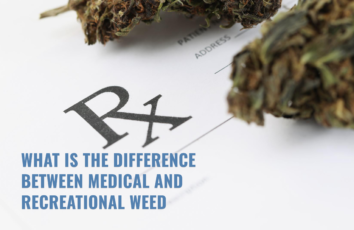Taxes Differences — Medical Vs Recreational Cannabis
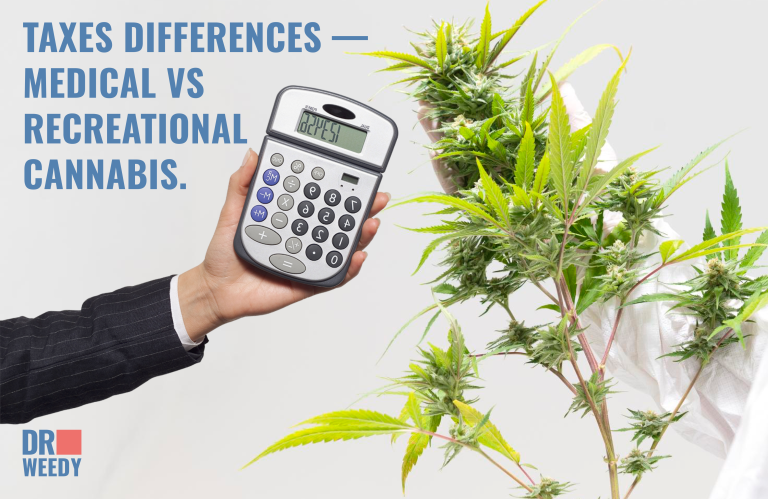
As the legalization of cannabis continues to sweep across various states in the United States, the cost of obtaining it is rapidly changing mostly due to the weight of taxation. The tax implications of cannabis can be significant, impacting accessibility and usage, as well as businesses, and state economies.
While both medical and recreational marijuana have their own benefits, the tax implications vary widely. In this article, we’ll explore the different tax rates for medical and recreational marijuana, highlight where exemptions exist, and provide information on how to get a medical marijuana card. Want to stay up-to-date on the latest developments in cannabis taxation? Keep reading.
What are the differences between medical marijuana and recreational marijuana?

Generally, medical marijuana, prescribed by qualified healthcare professionals, is known for its lower THC content and higher CBD content. It is primarily utilized to treat specific medical conditions and provide therapeutic benefits. On the other hand, recreational marijuana contains higher THC content and lower CBD content, making it suitable for non-medical purposes like relaxation and social enjoyment.
The Different Kinds of Taxes You May Pay When Buying Medical or Recreational Cannabis
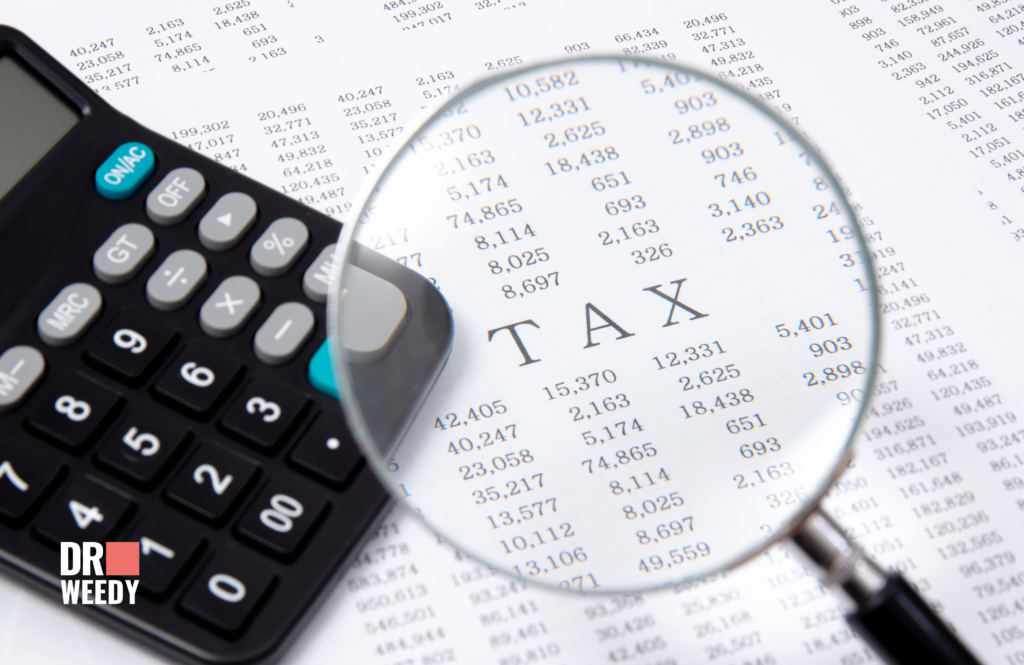
While the tax structure and rates can change over time as regulations and laws evolve, you will generally be required to pay at least one of these:
- Excise Tax: This is the tax that manufacturers and distributors pay on cannabis products. It’s usually a percentage of the product’s retail price and may vary based on factors like THC content and product type.
- Sales Tax: Just like with other consumer goods, most states apply a regular sales tax to retail cannabis sales. It’s calculated as a percentage of the purchase price.
- Cultivation Tax: Some places have a tax on growing cannabis plants. Licensed growers typically pay this tax, which is based on factors like the number of plants, canopy size, or weight of harvested cannabis.
- Local Taxes: Local governments can add extra taxes on marijuana sales to fund local services and initiatives. The amount can vary and depends on the area.
- Use Taxes: If you buy cannabis from an unlicensed source or bring it into a jurisdiction with different tax rates, a use tax may be imposed on you. It’s a tax on the use, storage, or consumption of cannabis products.
- Sin Taxes: These taxes aim to discourage consumption and generate revenue for public health programs.
- Social Equity Taxes: To address the effects of cannabis prohibition on communities, some jurisdictions may impose taxes earmarked for social equity programs that support individuals and groups that were disproportionately affected by the war on drugs.
What are the tax implications of consuming medical and recreational marijuana?
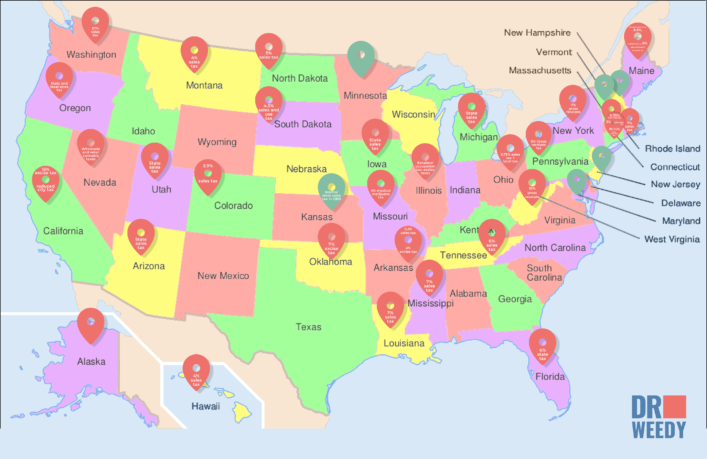
The taxation structure for medical and recreational marijuana varies significantly from state to state. Medical marijuana generally enjoys more tax relief than recreational marijuana, with some states offering discounts or exemptions on medical cannabis products to improve the accessibility and affordability of treatment. On the other hand, recreational cannabis is often subject to higher taxes, which can impact its affordability and availability.
Adult use taxes are generally higher than those imposed on medical marijuana as many states employ it as a means of generating revenue and systematically controlling usage.
Below is a comprehensive interstate breakdown of taxation for both medical and recreational marijuana.
|
State |
Medical Marijuana Tax |
Recreational Marijuana Tax |
|
Alabama |
9% of gross proceeds |
No recreational marijuana program. |
|
Alaska |
$50/oz. mature flower; $25/oz. immature flower; $15/oz. trim; $1 per clone |
|
|
Arizona |
State sales tax |
16% state excise tax + local tax |
|
Arkansas |
6.50% sales tax + 4% excise tax |
No recreational marijuana program |
|
California |
15% excise tax + reduced city tax (if there is one) |
15% excise tax + 8-10% sales tax + 5-15% local government cannabis business tax |
|
Colorado |
2.9% sales tax |
15% state retail marijuana sales tax + 15% excise tax + local tax |
|
Connecticut |
6.35% state sales tax, a 3% municipal tax, and a 10-15% state cannabis tax linked to THC levels for each purchase. |
|
|
District of Columbia |
N/A |
5.75% sales tax |
|
Florida |
6% state tax |
No recreational marijuana program |
|
Georgia |
N/A |
No recreational marijuana program |
|
Hawaii |
4% sales tax |
No recreational marijuana program |
|
Illinois |
Retailers’ occupation tax, excise taxes |
7% excise tax of value at the wholesale level; 10% tax on cannabis flower or products with less than 35% THC; 20% tax on products infused with cannabis, such as edible products; 25% tax on any product with a THC concentration higher than 35%.
|
|
Iowa |
State sales tax |
No recreational marijuana program |
|
Kansas |
Normal state sales tax in CBD |
No recreational marijuana program |
|
Louisiana |
7% sales tax |
No recreational marijuana program |
|
Maine |
General sales tax is 5.5%, edibles have an 8% rate, and there’s no excise tax |
10% sales tax plus exise tax according of weight of marijuana products |
|
Maryland |
Exempt from sales tax |
9% of the sales price |
|
Massachusetts |
State sales tax, local option tax |
6.25% state sales tax, 10.75% state excise tax, up to 3% local option tax |
|
Michigan |
State sales tax |
6% sales tax and 10% excise tax |
|
Minnesota |
||
|
Mississippi |
No recreational marijuana program |
|
|
Missouri |
4% medical marijuana tax |
6.25% Occupation tax and a maximum of 3.75% municipal tax |
|
Montana |
4% sales tax |
20% state excise tax + local tax |
|
Nebraska |
N/A |
N/A |
|
Nevada |
Wholesale and retail cannabis taxes |
10% retail excise tax, 15% excise tax (fair market value at wholesale) |
|
New Hampshire |
No sales tax |
No recreational marijuana program |
|
New Jersey |
6.65% state sales tax, additional social equity fee. |
|
|
New Mexico |
N/A |
12% excise tax |
|
New York |
13% retail excise tax for adult-use, additional excise tax based on potency |
|
|
North Carolina |
No recreational marijuana program. |
|
|
North Dakota |
5% sales tax |
No recreational marijuana program. |
|
Ohio |
5,75% sales tax plus local tax |
No recreational marijuana program. |
|
Oklahoma |
No recreational marijuana program. |
|
|
Oregon |
State and local sales tax |
17% state excise tax, local tax for recreational cannabis |
|
Pennsylvania |
No recreational marijuana program. |
|
|
Rhode Island |
7% sales tax |
10% sales tax |
|
South Dakota |
4.5% sales and use tax |
15% excise tax and 4.5% sales tax |
|
Tennessee |
6% sales tax |
No recreational marijuana program. |
|
Texas |
N/A |
No recreational marijuana program. |
|
Utah |
State sales tax |
No recreational marijuana program. |
|
Vermont |
Exempted from sales tax |
14% cannabis excise tax |
|
Virginia |
N/A |
21% retail cannabis excise tax + local taxes |
|
Washington |
37% sales tax |
37% sales tax |
|
West Virginia |
10% gross receipts |
No recreational marijuana program. |
Which US States Have Highest Recreational Marijuana Taxes?
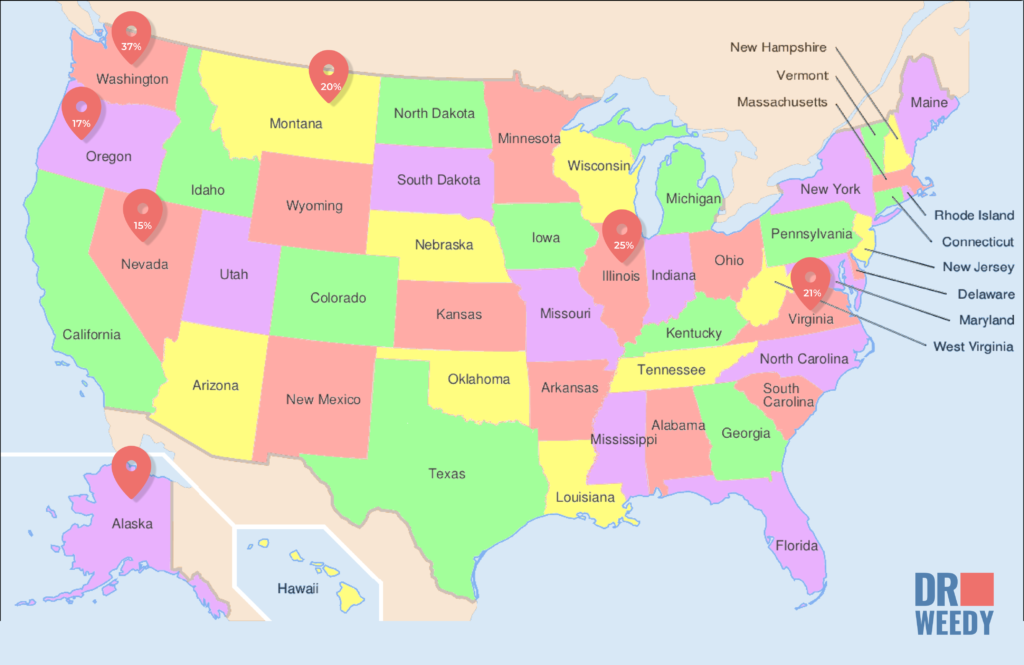
Despite the substantial annual revenue generated by the cannabis industry, it remains classified as a Schedule 1 drug, resulting in its continued federal prohibition. The absence of federal regulation has granted individual states the autonomy to determine both the legalization status of cannabis and the tax rates imposed on it. Here are some US states with the highest tax rates on recreational cannabis:
|
State |
Recreational Tax Rate |
|
Alaska |
Highest estimated tax on an ounce at $57.50, largely attributed to the $50-per-ounce tax on cannabis flower in that state. |
|
Washington |
37% excise tax – the second-highest total taxes on a hypothetical ounce at $47.25. |
|
Illinois |
Cannabis over 35% THC is taxed at 25%, while infused products are taxed at 20%. |
Montana |
20% excise tax |
|
Nevada |
15% excise tax |
|
Oregon |
17% excise tax |
Virginia |
21% excise tax |
What does the government do with marijuana Taxes?
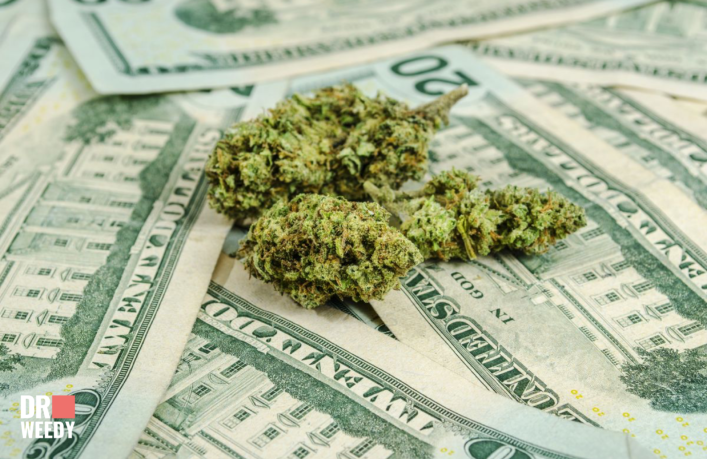
The government spends marijuana taxes in various ways to benefit society and address different areas of public interest. Generally, the revenue from marijuana taxes is commonly allocated thus:
- Financing education: The tax revenue is often directed toward funding public school construction and supporting educational programs for youth.
- Public health initiatives: Some funds are allocated to public health initiatives aimed at promoting awareness, research, and related projects.
- Law enforcement: A portion of the tax revenue is used to support law enforcement efforts related to marijuana regulation and enforcement.
- Substance abuse prevention programs: The government invests in programs that help prevent substance abuse and provide support for individuals struggling with addiction.
- Infrastructure development: In some states, marijuana tax revenue may contribute to infrastructure development projects, improving transportation systems, and enhancing public facilities.
So next time you are taxed on purchasing medical or recreational cannabis, simply know that you are contributing your own quota to the development of society.
Benefits of Having Your MMJ Card

Have you gotten your MMJ card? A Medical Marijuana (MMJ) card can bring about significant tax benefits for patients, amongst other advantages. Here are some of them:
- You save money on taxes: With an MMJ card, you get to pay at least 10% less in taxes compared to recreational consumers. In some states, you may be totally exempted from sales tax.
- Grow more plants: MMJ cardholders may have the opportunity to cultivate cannabis plants at their residence, provided it is allowed under the regulations of their respective state.
- Access to Safer and Potent Medical Products: Medical-grade marijuana products undergo stringent testing for safety and potency.
- Access to a wider range of dispensaries and cannabis strains.
- Traveling Advantages: Having your MMJ card provides traveling advantages, including reciprocity in states that recognize it, as well as enhanced legal protection during your travels.
- Workplace Tolerance: Some employers recognize the medical necessity and tolerate marijuana use for medical cardholders.
- Protection under the Law: Offers more legal protection from issues related to marijuana use. Provides a line of defense in case of encounters with law enforcement.
- Unemployment Benefits: An MMJ card protects unemployed individuals in states like Michigan, allowing them to continue receiving unemployment benefits even if they test positive for marijuana.
Where Can I Get My MMJ Card?
If you’re looking for a convenient and hassle-free way to obtain your MMJ card, look no further than Dr. Weedy. With our easy-to-use online platform, you can easily complete your application, speak with a state-certified medical marijuana doctor, and get your MMJ card, all from the comfort of your home. The process is seamless and fast.

Dr. Weedy is a telemedicine platform that allows you to connect with a state-licensed doctor from the comfort of your own home. By choosing us for your MMJ card, you enjoy the following:
- Convenience: The entire process can be done online, from the comfort of your own home.
- Competitive Rates: Our services are offered at competitive rates to ensure you have access to medical marijuana to keep your health in tip-top shape.
- Experienced Doctors: Here at Dr. Weedy, we work with a network of state-licensed doctors who are experienced in evaluating patients for medical marijuana.
- Confidential: Your personal information is protected by HIPAA compliance.
- Money-Back Guarantee: If you are not approved for a medical marijuana card, you will get your money back.
If you are looking for a convenient, affordable, and reliable way to get your medical marijuana card, Dr. Weedy is the perfect choice for you.
In addition to the above, you also enjoy:
- Access to a wider range of products
- Higher purchase limits
- Lower taxes
- The ability to grow your own plants
Final Thoughts
The legalization of cannabis has led to a new debate about taxation. Some argue that high taxes are necessary to discourage use, while others say that they make cannabis unaffordable for patients and recreational users alike.
The truth, however, is that there is no one-size-fits-all answer to the question of how much cannabis should be taxed. The ideal tax rate will vary depending on the specific circumstances of each state. Apply for your medical marijuana card today to ensure accessibility and compliance. Stay well.
Sources
- Cannabis Taxes. (2023). Urban Institute. https://www.urban.org/policy-centers/cross-center-initiatives/state-and-local-finance-initiative/state-and-local-backgrounders/marijuana-taxes
- Cash, M. C., Cunnane, K., Fan, C., & Romero-Sandoval, E. A. (2020). Mapping cannabis potency in medical and recreational programs in the United States. PLoS ONE, 15(3). https://doi.org/10.1371/journal.pone.0230167
- Heidrich D. Cannabis At-a-Glance: Legalized Marijuana in Maine. https://www.maine.gov/revenue/sites/maine.gov.revenue/files/inline-files/8_STS2021Legalized%20Marijuana%20in%20Maine_0.pdf
- Oglesby, P. (n.d.). Marijuana Taxes for North Carolina https://ncdoj.gov/wp-content/uploads/2022/03/Oglesby-slides.pdf























